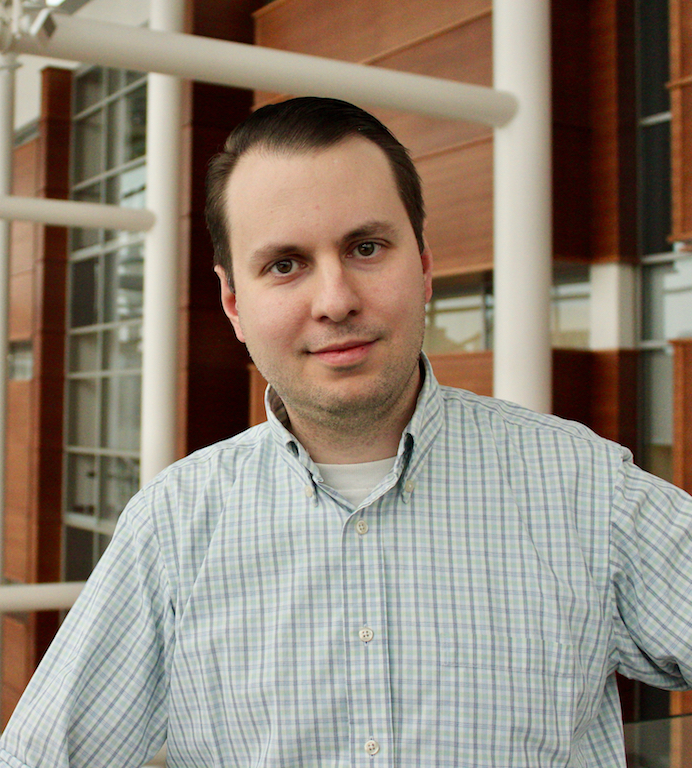Aaron Stephen Rury (gk7795)
University information
Contact information
College of Liberal Arts and Sciences
Chem 77
Research in the Material Structural Dynamics Laboratory (MSDL) strives to uncover the fundamental physical processes that lead to useful properties in emerging materials. New materials with useful and exotic properties remain necessary for the development of next generation technologies in electronics, photonics and information science. The discovery of new materials also means the development and use of tools to explore the physical mechanisms from which their properties derive. Student and postdoctoral researchers in the MSDL will use experimental, theoretical and computational methods to tackle problems that span the fields of chemistry, physics, materials science and optics to connect physical mechanisms to material properties.
Our approach in the MSDL is founded on understanding material structure-function relationships through the lens of vibrational spectroscopy. In particular, we design, develop and deploy vibrational spectroscopic techniques based on pulses of laser light whose durations are less than 1 tenth of one trillionth of a second (10-13 s). Light pulses this short possess peak intensities that drive multiple photon-material interactions and give rise to the nonlinear optical properties of materials. In the MSDL, we will use these nonlinear optical interactions to produce new wavelengths of light, induce quantum coherent vibrational evolution and watch the ultrafast dynamics of photo-excited material systems.
Initial projects in the MSDL include:
- Charge carrier and energy transport in emergent semiconductors: Despite their promise to reduce the cost of electronic components, semiconducting materials formed from molecules have not been able to significantly penetrate our daily lives. Much of this fact stems from our lack of a clear physical picture of charge and energy transport in these materials. In the MSDL, we will apply ultrafast vibrational spectroscopic techniques to address this uncertainty and supply new knowledge on how charge moves through these materials.
- Designing material properties using next generation photochemistry: By confining a resonant electromagnetic fields near a material one can form new states whose nature mixes matter and light. These states provide a novel phase space to pursue the design and characterization of new material properties. We will form these states, determine how they affect material properties and characterize the physical mechanisms leading to these changes using nonlinear and ultrafast spectroscopic techniques.
- Dynamics near ferroelectric phase transitions: Ferroelectric materials possess the propensity to replace conventional magnetic memory at a substantially reduced cost in energy. Despite this promise, it remains unclear how to drive such materials between ferro- and paraelectric phases for memory storage and readout. We will develop novel coherent Raman pump-THz probe spectroscopic techniques to understand how specific vibrational excitations can be used to drive these transitions.
- Faculty Early Career Development (CAREER) Award, National Science Foundation, 2023
- Young Investigator Research Award, Air Force Office of Scientific Research, Department of Defense, 2018
- Doctoral New Investigator Award, Petroleum Research Fund, American Chemical Society, 2018
- 'Defect-Induced Narrowband Light Emission from a 2D Hybrid Lead Iodide Perovskite', Adedayo M. Sanni, Sydney N. Lavan, Zhen-Fei Liu and Aaron S. Rury, The Journal of Physical Chemistry C, 2021, 125, 28004–28012
- 'Local molecular probes of ultrafast relaxation in strongly coupled metalloporphyrin-cavity systems.' Aleksandr G. Avramenko and Aaron S. Rury, The Journal of Chemical Physics, 155, 064702, (2021); invited contribution to the special issue on cavity polaritons
- 'Characterization of the Ammonium Bending Vibrations in Two-Dimensional Hybrid Lead-Halide Perovskites from Raman Spectroscopy and First-Principles Calculations.' Sydney N. Lavan, Adedayo M. Sanni, Aaron S. Rury and Zhen-Fei Liu, The Journal of Physical Chemistry C, 2021, 125, pp 223-236
- 'Kinetic Molecular Cationic Control of Defect-Induced Broadband Light Emission in 2D Hybrid Lead Iodide Perovskites.' Adedayo M. Sanni and Aaron S. Rury, The Journal of Physical Chemistry Letters, 2021, 12, pp 101-110
- Anharmonic Molecular Vibrational Probes of Dynamical Organic-Inorganic Interactions in 2D Hybrid Lead Iodide Perovskites' Adedayo M. Sanni, Sydney N. Lavan and Aaron S. Rury, The Journal of Physical Chemistry C, 2020, 124, pp 13942-13955
- 'Structural Anharmonicity Explains Continuous Frequency Shifts of Intramolecular Ring Vibrations in a Hydrogen-Bonded Antiferroelectric Crystal', Sydney N. Lavan, Cathleen A.Saraza, Kanwar Bhullar*, Sardou Sabeyo-Yonto*, Adedayo M. Sanni and Aaron S. Rury, The Journal of Physical Chemistry C, 2020, 124, pp 12933-12947
- 'Quantum Control of Ultrafast Internal Conversion using Nanoconfined Virtual Photons', Aleksandr G. Avramenko and Aaron S. Rury, The Journal of Physical Chemistry Letters, 2020, 11, pp 1013-1021
- 'Interrogating the Structure of Molecular Cavity Polaritons with Resonance Raman Scattering: An Experimentally Motivated Theoretical Description', Aleksandr G. Avramenko and Aaron S. Rury, The Journal of Physical Chemistry C, 2019, 123, pp 30551-30561
- 'Probing the Fabry-Perot Modes of Self-Assembled Excitonic Microcrystals with Subgap Light Emission', Adedayo M. Sanni, Shofikur Shohag* and Aaron S. Rury, The Journal of Physical Chemistry C, 2019, 123, pp 23103-23112
- 'Room Temperature Broadband Light Emission From Hybrid Lead Iodide Perovskite-Like Quantum Wells: THz Spectroscopic Investigation of Metastable Defects', Adedayo M. Sanni, Sydney N. Lavan, Aleksandr Avramenko, Federico Rabuffetti, Leopoldo Suescun and Aaron S. Rury, The Journal of Physical Chemistry Letters, 2019, 10, pp 1653-1662
- 'Defects Cause Subgap Luminescence from a Crystalline Tetracene Derivative', R. Eric McAnally, Jon A. Bender, Laura Estergreen, Ralf Haiges, Stephen E. Bradforth, Jahan M. Dawlaty, Sean T. Roberts and Aaron S. Rury, The Journal of Physical Chemistry Letters, 2017, 8, pp 5993–6001

Courses taught by Aaron Stephen Rury
Winter Term 2025 (current)
- CHM4850 - Frontiers in Chemistry
- CHM7480 - Molecular Spectroscopy
- CHM8830 - Seminar in Physical Chemistry
- CHM8850 - Frontiers in Chemistry